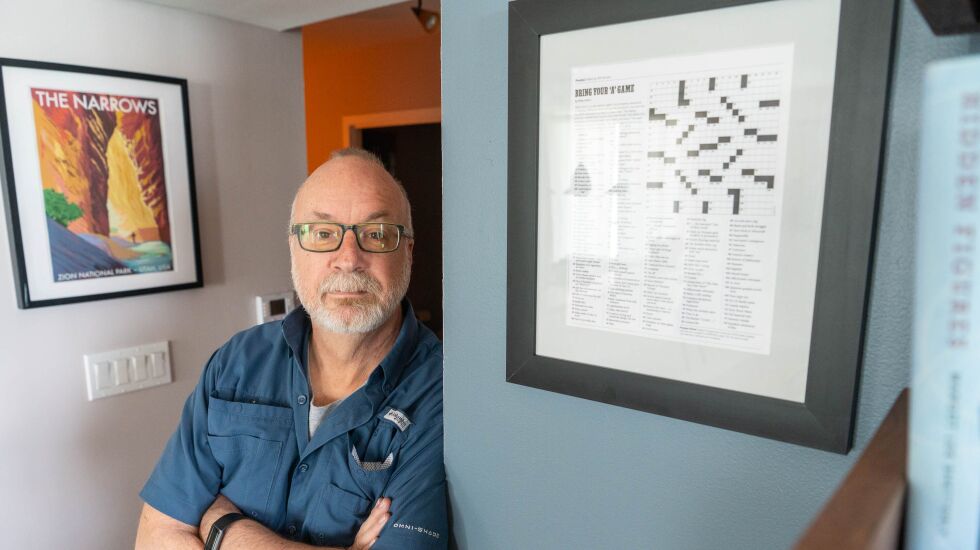
Early in the pandemic, Mike Hobin thought it would fun to try to create his own crosswords.
At first, it was a brainy exercise to pluck puckish, playful, punny words out of thin air.
Then, Hobin, 64, a real estate broker who lives in a high-rise in Edgewater, started taking it more serioiusly. He spent $50 on crossword software and devoted an hour or so every day to the effort.
And he started to wonder: Could I ever get good enough at this to get a crossword published by the gold standard of crossword publishers — The New York Times?
The Times solicits people to give it a shot and gets hundreds of submissions every week. Only a small percentage, though, end up getting published.
“I thought it would be a cool goal: Make some, send them into the Times, see what the hell happens,” Hobin says.
Rejection after rejection followed. With each one came tips on how to improve. Pinches of promise, you might say.
So Hobin kept at it. He started seeing possible crossword clues and answers everywhere — in conversations, songs, signs.
Wordplay, it seems, had hijacked a portion of his brain.
“It’s the price you pay for getting too heavily into crossword-making,” Hobin says. “It sort of grabs part of your brain and is always working. You hear phrases, see things written down and see them differently. And you go, ‘Oh!’ ”
In December, finally, after being rejected 24 times, he got a different response to his latest submission.
It wasn’t accepted. But it wasn’t rejected, either. Hobin was told it was “very, very good.” But could he rework it a bit?
“There was probably some fist-pumping going on,” says Hobin, who’s married and has an adult son.
So he reworked it, as asked. This time, the answer he got was: Yes, we’ll publish this.
The Times ran the puzzle in its Sunday paper on April 16. The puzzle also appears in this week’s Sunday Sun-Times.
With success came a $1,500 payment and a “well-done” note from Will Shortz, the Times’ famed lead puzzle editor.
“Honestly, I didn’t do it for the money,” says Hobin, who estimates that he spent about 12 hours on the puzzle, which he tagged with the theme: “Bring Your ‘A’ Game.”
In a note atop the puzzle, Shortz gives Hobin a brief shoutout and mentions that he credits seeing the documentary “Wordplay” — which featured Shortz and comedian Jon Stewart — with providing him the eureka moment in which he realized that The Times accepts crossword submissions from the public.
A few days ago, he got a note from the filmmakers.
“It was pretty cool,” he says. “They asked for my address because they wanted to send me something.”
Tobin says he first tried creatin a crossword puzzle about 20 years ago, using a few sheets of grid paper. By his second try, though, he’d had enough, and he gave up.
He says the puzzle software he got, with access to a website that lets users review Times puzzles going back decades, helped him with creating the structure and ensuring that he wasn’t repeating anything that already has been done.
“It’s kind of hard to describe,” Hobin says of creating a crossword puzzle. “It’s like riding a bike. You just have to do it. The hardest part is coming up with a good, original theme.”
Now, Hobin’s working on more crosswords to submit. He says he has about 200 ideas saved on his phone. And the list keeps growing.







